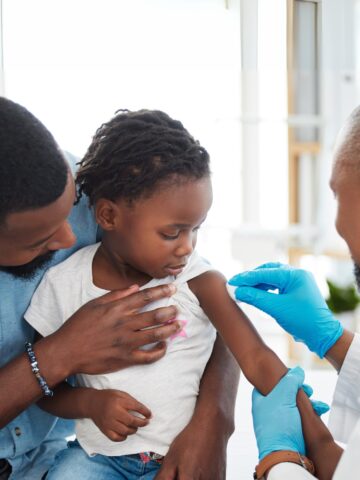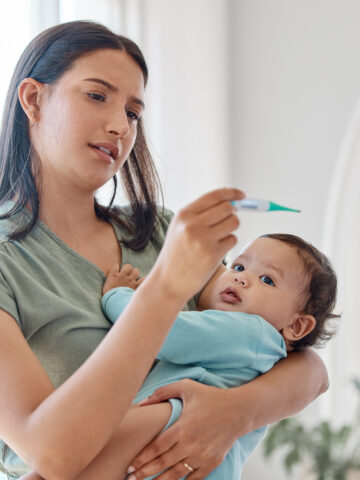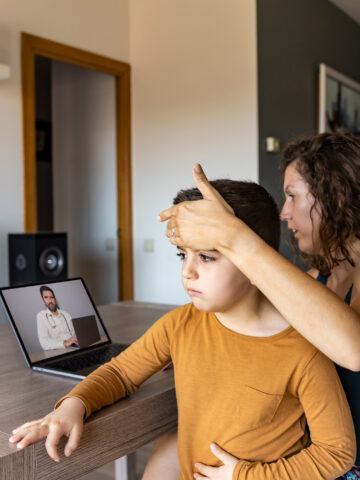COVID-19 prevention measures like wearing masks, washing hands thoroughly and regularly, and practicing social distancing have also contributed to a reduction in influenza and respiratory illnesses.
But as the world begins to open up and people begin relaxing their precautionary measures, an increase in colds and viruses are expected – especially for children.
“In general, kids have been sheltered for a year now and haven’t been exposed to viruses and built up their immunity,” says Dr. Jasjit Singh, a pediatric infectious disease specialist and medical director of infection prevention at CHOC. “As things open up, they’re going to be exposed to more viruses and may develop more colds than usual.”
Already, the U.S. Centers for Disease Control and Prevention has issued a recent advisory about increased rates of respiratory syncytial virus, or RSV, in the last few months in some parts of the United States.
So, what can parents do to help minimize the risk of respiratory infections as children begin returning to activities, daycares and other settings more crowded than what was previously encountered during stay-at-home orders this past year?
Here, Dr. Singh offers tips to help to reduce the impact of re-entry on a child’s immune system:
Continue wearing masks
The pandemic has shown that mask wearing is effective against the spread of illness, so Dr. Singh advises that people continue wearing masks in crowded indoor locations where the COVID-19 vaccine status of people nearby may be unknown.
Additionally, some people may want to continue wearing masks because they are immune suppressed or at risk, or if someone at home is high-risk. They may also choose to wear a mask out of solidarity for service workers or children who aren’t yet old enough to receive the vaccine.
If person at home is already ill with a respiratory virus, a parent might consider wearing a mask while caring for them or asking siblings to wear one to help reduce the spread among family members.
Light-weight surgical masks or two-layered cotton masks are sufficient in these cases, Dr. Singh says.
If a child were already accustomed to wearing a mask during COVID-19 protocols, a parent might suggest they continue to wear the mask when they are sick. This will also help reduce the spread of illness around a home. The child is most contagious during the first four days of symptoms.
Here are tips from a CHOC psychologist to help support children learning to wear masks.
Keep up with the handwashing
You perfected your hand washing during the pandemic, so keep at it. This is a key way to curb the spread of respiratory illnesses
Remember to scrub vigorously with soap and warm water for 20 seconds, being sure to wash the backs of hands, between fingers, under fingernails and under the wrists.
Wash before and after eating, after using the restroom, after handling animals and after changing diapers is an important step to help curb the spread of respiratory illnesses.
Hand sanitizers containing at least 60 percent alcohol are also effective against these viruses.
Here are tips to help protect against dry hands from frequent handwashing.
Practice cough, sneeze etiquette
Cough or sneeze into a tissue or the inner crook of the elbow to minimize the spread of illness-inducing droplets.
Used tissues should be thrown away quickly, and people should wash their hands or use hand sanitizer every time they touch their mouth or nose.
Clean high-touch surfaces
While there’s no need to wipe down groceries, it’s still a good idea to frequently disinfect areas and objects in the home that are touched frequently.
These surfaces and objects include kitchen and bathroom counters, door knobs and light switches.
Stay home if you’re sick
The pandemic reinforced what we’ve known for a long time: minimizing contact with others reduces the spread of illness.
So, if a child or family member is sick, they ought to stay home from school, work or extracurricular activities until symptoms resolve.
Here’s a list of activities to keep children occupied while at home.
Get high-quality sleep
Good sleep is a great immune booster. During sleep, the body’s immune system releases proteins that need to increase during infection or stress. So, ensure children get adequate amounts of sleep.
Though each person is different, here are some estimates for how much sleep children need in a 24-hour period, including naps:
- 12 months to 3 years: 11 to 13 hours
- 3 to 5 years: 11.5 to 12 hours
- 6 to 12 years: 9 to 10 hours
- 12 to 18 years: 8.5 to 9.5 hours
Here are seven tips to help children sleep better.
Practice healthy eating
Maintaining a healthy diet helps ensure the immune system is ready to fight against viruses and infections. Adequate caloric intake is crucial to help the body function at its best. Protein, vitamin C, vitamin A, lycopene and zinc are all helpful immune system boosters and can be found naturally in healthy foods. Always try to obtain nutrients from food sources, rather than supplements.
Here is more information from a CHOC dietitian about how nutrition can support the immune system.
Get more expert health advice delivered to your inbox monthly by subscribing to the KidsHealth newsletter here.
Learn more about COVID Vaccines for Children and Teens
Get answers to your frequently asked questions – and some peace of mind – with this complete guide to COVID-19 vaccines from CHOC pediatric experts.





